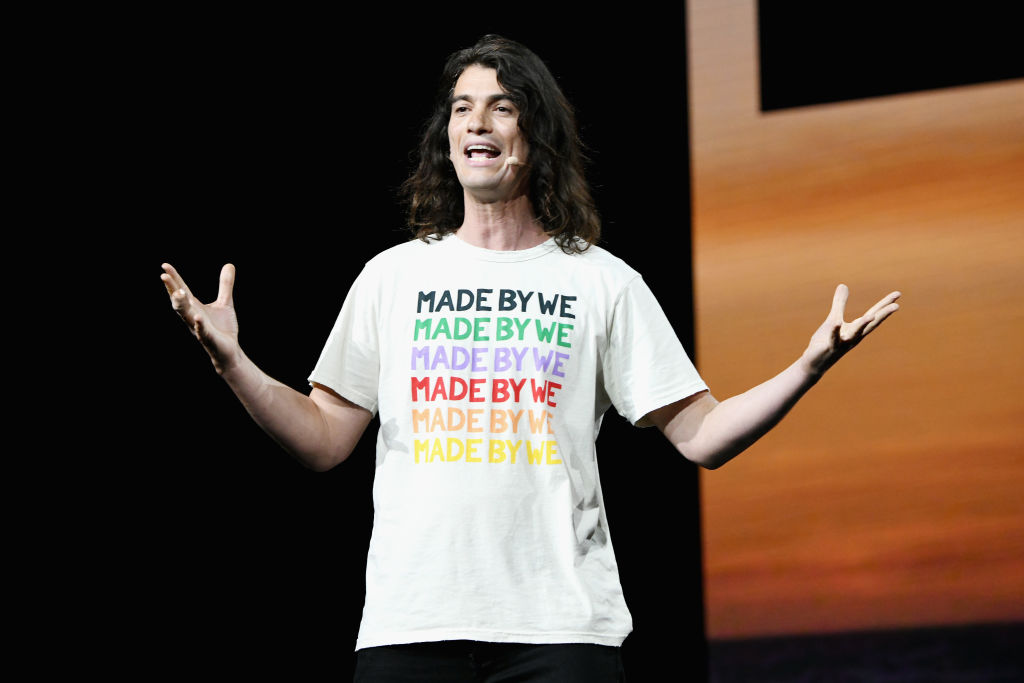
They built him up. And now they want to bring him down.
SoftBank’s sudden turn against WeWork CEO Adam Neumann highlights how the Japanese conglomerate has wielded far more dollars than sense in its investment strategy. Officials tied to SoftBank want Neumann to step down as CEO, according to reports over the weekend.
SoftBank and its Vision Fund are WeWork’s biggest investors, with a stake of around 29% in We Co., the company’s official name. That support is a key reason why this real-estate rental company fetched a $47 billion valuation.
To SoftBank, WeWork was a unicorn on the rise. Its corporate peccadilloes, which largely revolve around corporate governance, appear to have been ignored by executives at the Japanese company: WeWork was a unicorn and SoftBank just had to be part of it. So SoftBank kept pouring in more money, just as it did with other great startups like Uber Technologies Inc., Didi Chuxing and Slack Technologies Inc. At one point SoftBank founder Masayoshi Son described WeWork as the next Alibaba Group Holding Ltd. in reference to the fortune he made from investing in Jack Ma’s Chinese e-commerce giant.
It wasn’t until WeWork filed its IPO prospectus in August that the rest of the world saw in clear daylight what SoftBank’s common sense-radar had failed to detect when it signed each check. As my colleague Shira Ovide wrote at the time, the list of “transactions involving a company’s CEO or other insiders is astonishing for WeWork.”
Among them: Neumann’s wife is one of two or three people who get to choose a successor if he is incapacitated; the CEO owns stakes in some of the office buildings that WeWork leases; and at least two members of Neumann’s family did work for the company’s Creator Awards, which its biggest outside shareholder committed $180 million to fund.
That outside shareholder is none other than SoftBank – a stark reminder that Masayoshi Son and his team not only knew of these dealings, it actively enabled them.
Because these red flags have spooked other investors, WeWork is looking more like it’ll fetch $15 billion when it eventually lists. So now SoftBank cares, to the tune of a $9 billion lower value on its stake. It’s too late to exit WeWork. But it’s not too late to exit Neumann.
Comparisons to Uber are inevitable. Co-founder Travis Kalanick faced numerous complaints about his erratic management style and questionable judgment. SoftBank’s entry into into the ride-hailing giant’s capitalization table was part of the solution to a problem. Son bought out a lot of Kalanick’s stake, giving other shareholders and board members leverage to push out the CEO and replace him.
In WeWork’s case, it may be that Son himself is wielding the cutlass. According to CNBC, his maneuver is seen by some as part of an effort to stop a planned IPO altogether. Last week I discussed why halting the IPO might be good for SoftBank.
Just as a new CEO helped revive sentiment toward Uber, and prepare it for a successful IPO, Son is likely betting that simply getting rid of Neumann and pretending that will fix things should be enough to juice the valuation when a listing does eventually happen. And should installing a new CEO result in, say, a $25 billion valuation instead of $15 billion, then that would be a $3 billion win for SoftBank.
Yet this recent maneuvering by SoftBank suggests the concern isn’t WeWork’s funky corporate structure, but that public-market investors don’t like this funky corporate structure. It’s like a kid not being sorry for dipping his hand in the cookie jar, but for getting caught.
It tells us also that SoftBank is tone deaf. WeWork’s structure should have raised red flags even before it decided to pump billions into the company. It could have gone straight to Neumann and the existing board and pushed for change, because that’s the kind of power a big stack bully with a $100 billion checkbook wields.
Instead, it looks like SoftBank’s biggest concern was the Vision Fund’s much-vaunted internal rate of return.
It’s very possible this WeWork saga will be a wake-up call to SoftBank. Maybe now they’ll be clear-sighted enough to spot landmines before they hit them – instead of boldly barreling down the unicorn highway in the belief that speed negates any need for caution.
But with plans for a second $100 billion Vision Fund, prospective investors will be asking if they want to bet on it.
More Must-Reads from TIME
- Breaking Down the 2024 Election Calendar
- How Nayib Bukele’s ‘Iron Fist’ Has Transformed El Salvador
- What if Ultra-Processed Foods Aren’t as Bad as You Think?
- How Ukraine Beat Russia in the Battle of the Black Sea
- Long COVID Looks Different in Kids
- How Project 2025 Would Jeopardize Americans’ Health
- What a $129 Frying Pan Says About America’s Eating Habits
- The 32 Most Anticipated Books of Fall 2024
Contact us at letters@time.com